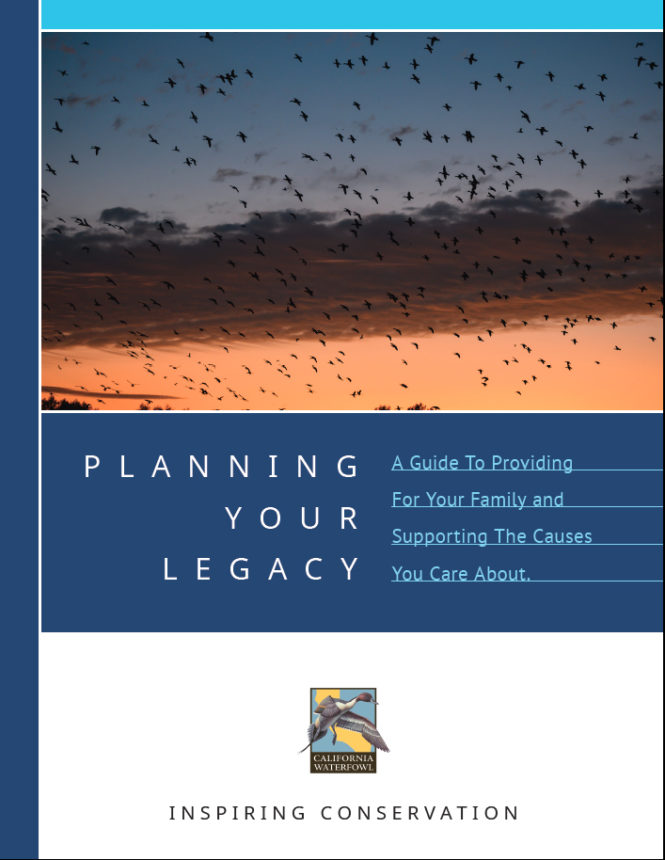
The late Ellis Stephens—shown with his daughters at his home in Ross, California—donated a Delta island to California Waterfowl. Read about his gift (PDF).
A planned gift is simply one that uses current tax law to maximize both giving and tax planning.
For example, you can make a cash gift, or you can give other appreciated assets and have a greater tax savings.
Stock gifts
Make a gift by transferring stock directly to CWA. In giving appreciated stock, you bypass any capital gains tax but still receive a full tax deduction. The key is to transfer the stock. If you sell it first, you will be liable for the tax on any gains.
Real estate
There are a number of ways to give real estate, depending on the type of property and the intent for its use. Appreciated real estate may be good for a Charitable Remainder Trust, where you bypass the taxes when selling the property and receive income for life or a term of years. You receive the tax deduction while you’re still alive and CWA receives the remainder of the assets when you are gone.
Give a duck club
If you own a duck club, or an equity stake, consider giving that club to CWA instead of selling it, or gifting it through your estate. CWA can use property in a number of ways depending on the donor’s intent and the property itself: 1) CWA maintains the property and uses it for habitat projects, public hunting and/or education. Or 2) CWA sells the property to benefit CWA programs. If you have an equity stake, CWA can hold the property as a gift while remaining equity partners find a suitable buyer, and CWA receives the proceeds.
IRA Charitable Rollover
If you’ve reached the age of 70-1/2, you’re probably dealing with required minimum distributions, which increase your taxable income. If you are taking required minimum distributions and would like to make a gift, you may roll up to $100,000 in funds over directly to CWA and avoid the income tax. Since you’ve avoided the taxes, you don’t get an additional deduction, but you may also benefit by avoiding additional taxes, moving into a higher tax bracket or reaching an income threshold for Social Security.

David and Tina Ventura are leaving 60% of their estate to California Waterfowl. Read more (PDF)
Consider joining California Waterfowl's Pintail Legacy Society – folks who have left a gift through their estate.
If you have already included CWA in your estate, please let us know so we may recognize your generosity. Looking for a guide to estate planning? Download one here (7MB PDF), or call us at 916-648-1406 and ask us to mail you a copy!
Will
A will is the most common way people leave a gift or asset to CWA. You simply designate what you intend for CWA to receive in your will. If you have assets, including real estate, in your name, consider talking to an attorney about a living trust.
Trust
People with cash or other assets over $150,000, any real estate, businesses or other complex assets should consider a living trust. A living trust will minimize appraiser and attorney fees after you’re gone by avoiding probate, and make settling your estate significantly easier for your executor/trustee. Just like a will, you can list CWA as a recipient of a specific amount or percentage of your remainder assets.
Pay on Death Designations
By designating CWA as the beneficiary of investment funds (IRA, 401k, 403b, Roth IRA, stock accounts), your estate does not have to sell the funds and distribute them; the funds would move directly to CWA. Just remember: It is important to consider all of your assets in your estate plans and review your intentions and the order of any distributions with an estate planning attorney.
Insurance
Consider making CWA the beneficiary of a paid-up insurance policy. You receive a tax-deduction and California Waterfowl will either hold the policy to maturity, or may opt to take the cash-surrender value to support programs today. If the need for the insurance policy (supplemental income for spouse/children for example) is no longer a concern, gifting an insurance policy may be a good way to support CWA.
Significant Appreciated Assets and Charitable Remainder Trusts
If you are interested in simplifying your holdings or selling income-producing assets, you might consider a Charitable Remainder Trust. There are a few different designs for CRTs depending on your circumstances. With a UniTrust, you get an income tax deduction and predictable income for yourself/spouse while you’re alive. CWA programs will receive the remainder of the assets after you’re gone.
To learn more about joining the Pintail Legacy Society, please contact Gordon L. Nelson, CPA, CFP®, at 435-213-9986 or plannedgiving@calwaterfowl.org.



